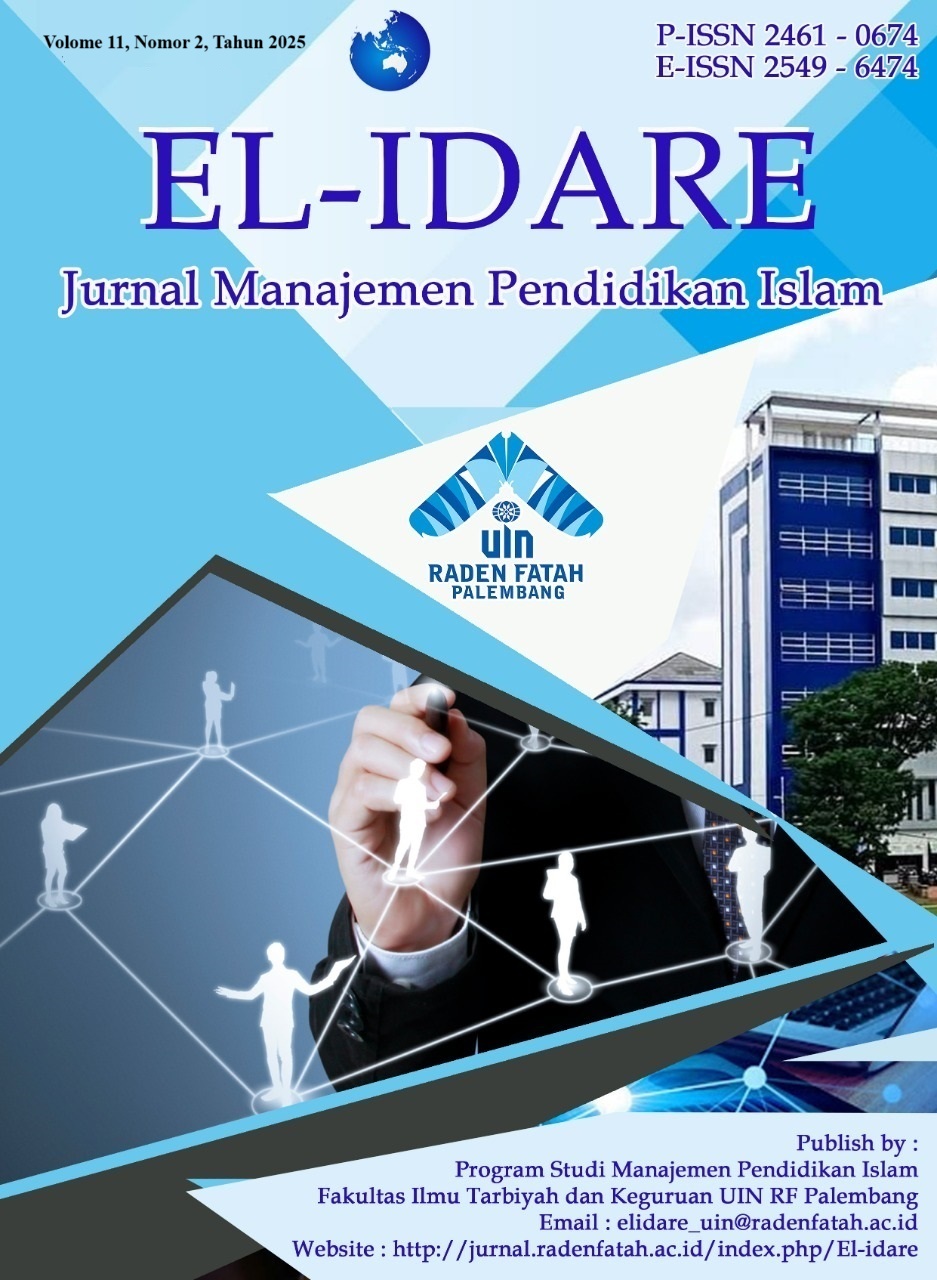SWOT Analysis (Strengths, Weaknesses, Opportunities, Threats) of Teachers in the Quality of Learning at Pondok Pesantren Darul Ma’arif NU Rejang Lebong
Main Article Content
Abstract
This study aims to analyze the SWOT (Strengths, Weaknesses, Opportunities, Threats) factors that influence teacher performance in relation to the quality of learning at Pondok Pesantren Darul Ma’arif NU Rejang Lebong. This approach is used to obtain a comprehensive understanding of the internal and external conditions that impact the effectiveness of the learning process. The method employed is a descriptive qualitative approach, using data collection techniques such as in-depth interviews, participatory observation, and documentation studies. The informants consist of the pesantren caretakers, teachers, senior students, and curriculum managers. Data analysis was conducted through the stages of data reduction, data display, and conclusion drawing using the SWOT framework. The results of the study show that teachers possess strengths in the form of high religious competence, dedication and moral integrity, as well as emotional closeness with the students. However, weaknesses were also identified, such as limited formal pedagogical training, the use of traditional teaching methods, and minimal utilization of educational technology. On the other hand, strategic opportunities exist in the form of support from the community and alumni, training programs from the government or civil society organizations, and the potential for collaboration with higher education institutions. Meanwhile, the threats faced include underutilized technological developments, competition with digitally-based institutions, and increasing expectations from students' parents. Based on the analysis results, a teacher development strategy has been formulated through enhanced pedagogical capacity, integration of technology in learning, and strengthening of external networks. This research is expected to serve as a strategic reference in the development of teaching resources to support the continuous improvement of learning quality in the pesantren environment.
Article Details

This work is licensed under a Creative Commons Attribution-NonCommercial-ShareAlike 4.0 International License.
The requirements that must be met by the author are as follows: 1.The author saves the copyright and gives the journal simultaneously with the license under Creative Commons Attribution License which permits other people to share the work by stating that it is firstly published in this journal. 2.The author can post their work in an institutional repository or publish it in a book by by stating that it is firstly published in this journal. 3.The author is allowed to post their work online (for instance, in an institutional repository or their own website) before and during the process of delivery. (see Open Access Effect).
How to Cite
References
Amrullah, H., Sari, R. R., Mas, M. A., Zahra, A., Gajayana, J., & Malang, N. (2024). Penguatan Mutu Pesantren Melalui Pelatihan Pembelajaran Berbasis IT Bagi Guru Pesantren. WISESA: Jurnal Pengabdian Masyarakat, 3(2), 45–50. https://doi.org/10.21776/ub.wisesa.2024.03.2.9
Anggraini, D., Shunhaji, A., & Tanrere, S. B. (2023). Optimalisasi Peran Guru Pengabdian Untuk Meningkatkan Kualitas Pembelajaran di Pondok Pesantren Al-Amanah Al-Gontory: Sebuah Tinjauan Efektivitas. Southeast Asian Journal of Islamic Education Management, 4(2), 201–216. https://doi.org/10.21154/sajiem.v4i2.212
Atabek, O. (2019). Challenges in Integrating Technology Into Education. Turkish Studies: Information Technologies and Applied Sciences, 14(1), 1–19. https://doi.org/10.7827/turkishstudies.14810
Bahrudin, A., Idi, A., Karoma, K., Hidayatullah, H., & Afryansyah, A. (2024). Tantangan Pembelajaran pada Pesantren di Era Digital. Indonesian Research Journal on Education, 4(4), 2458–2462. https://doi.org/10.31004/irje.v4i4.1643
Efrizal, D., Sofyan, D., & Syafryadin, S. (2024). Analysis of Teacher Pedagogical Competency in Learning English for Santri Students at the Modern Islamic Boarding School Darussalam Kepahiang. Al-Khair Journal: Management Education, 4(2), 166–177. https://doi.org/10.29300/al-khair.v4i2.6384
Garnika, E., Rohiyatun, B., & Najwa, L. (2021). Implementasi Analisis SWOT Dalam Perencanaan Peningkatan Mutu Pendidikan di Sekolah Dasar. ALIGNMENT:Journal of Administration and Educational Management, 4(2), 162–169. https://doi.org/10.31539/alignment.v4i2.3031
Gürel, E., & Tat, M. (2017). SWOT Analysis: A Theoretical Review. The Journal of International Social Research, 10(51), 1–8. https://doi.org/10.17719/jisr.2017.1832
Habibi, A., Mukminin, A., Yaqin, L. N., Parhanuddin, L., Razak, R. A., Nazry, N. N. M., … Fathurrijal, F. (2021). Mapping Instructional Barriers During Covid-19 Outbreak: Islamic Education Context. Religions, 12(1), 1–14. https://doi.org/10.3390/rel12010050
Hafid, H. (2018). Pendidikan Pesantren Dan Tantangan Modernisasi. Kariman: Jurnal Pendidikan Keislaman, 1(1), 47–66. https://doi.org/10.52185/kariman.v1i1.4
Hasan, M., Patimah, S., & Rinaldi, A. (2023). Professional Competence Of Educators In Islamic Boarding Schools: Training And Supervision. Journal of Advanced Islamic Educational Management, 2(1), 25–32. https://doi.org/10.24042/jaiem.v3i2.17229
Hidayat, A., Taufiq, A., Mufti, N., Munzil, M., Basri, M., & Herawati, L. R. (2024). Pelatihan Kompetensi Guru dalam Pengembangan Media Pembelajaran di Pondok Pesantren Bahrul Maghfiroh. Abdi: Jurnal Pengabdian dan Pemberdayaan Masyarakat, 6(3), 420–425. https://doi.org/10.24036/abdi.v6i3.861
Kurniawan, D. D., & Huda, S. T. (2021). Pemberdayaan Guru Pondok Pesantren di Kabupaten Batang Sebagai Upaya Meningkatkan Profesionalitas Guru dalam Program Pembangunan Berkelanjutan (Sustainable Development). Briliant: Jurnal Riset dan Konseptual, 6(2), 351–362. https://doi.org/10.28926/briliant.v6i2.626
Manshur, A., & Isroani, F. (2023). Tantangan Kurikulum Pendidikan Agama Islam Di Era Digital. Edukasi Islami: Jurnal Pendidikan Islam, 12(4), 351–368. https://doi.org/10.30868/ei.v12i04.8114
Muchasan, A., & Rohmawan, D. (2024). Pemanfaatan Teknologi di Pesantren (Dampak dan Solusi dalam Konteks Pendidikan). INOVATIF: Jurnal Penelitian Pendidikan, Agama, dan Kebudayaan, 10(1), 16–33. https://doi.org/10.55148/inovatif.v10i1.849
Muid, A., Arifin, B., & Karim, A. (2024). Peluang dan Tantangan Pendidikan Pesantren di Era Digital (Studi Kasus di Pondok Pesantren Al-Islah Bungah Gresik). MODELING: Jurnal Program Studi PGMI, 11(1), 512–530. https://doi.org/10.69896/modeling.v11i1.2254
Nuriz, M. A. F., & Awang, J. (2018). Islamic Education in Indonesia: Study of Azyumardi Azra’s Thought. International Journal of Islamic Studies, 5(2), 205–224. https://doi.org/10.22373/jar.v5i2.9836
Sirait, J. E. (2021). Analisis Pengaruh Kompetensi Guru Terhadap Keberhasilan Pembelajaran di Sekolah Dasar Bethel Tanjung Priok Jakarta Utara. Diegesis : Jurnal Teologi, 6(1), 49–69. https://doi.org/10.46933/dgs.vol6i149-69
Sugiyono. (2021). Metode Penelitian Kuantitatif, Kualitatif, dan R&D. Bandung: Alfabeta.
Susanti, S., Aminah, F., Assa’idah, I. M., Aulia, M. W., & Angelika, T. (2024). Dampak Negatif Metode Pengajaran Monoton Terhadap Motivasi Belajar Siswa. PEDAGOGIK: Jurnal Pendidikan dan Riset, 2(2), 86–93.
Utari, D., Harahap, R. M., & Ritonga, A. S. (2023). Kompetensi Guru Pesantren Modern (Studi tentang Pedagogical Content Knowledge). Nuris Journal of Education and Islamic Studies, 3(2), 139–146. https://doi.org/10.52620/jeis.v3i2.48
Wirayanti, Erna, & Cherawati. (2024). Metode Pendidikan Tradisional Pesantren dalam Membina Akhlak Santri (Studi Pesantren Nahdlatul Ulum Kabupaten Maros). Socius: Jurnal Peneliti Ilmu-ilmu SOsial, 1(10), 424–437. https://doi.org/10.5281/zenodo.13896925

